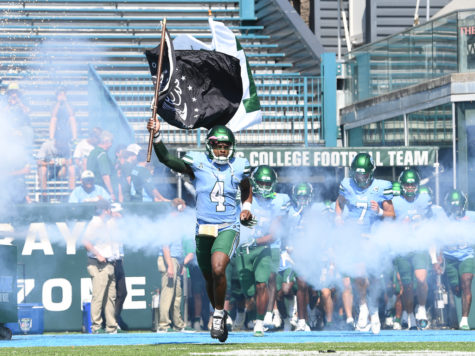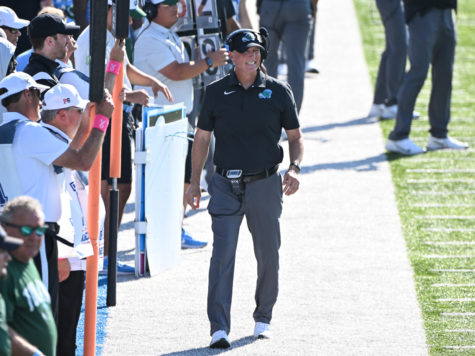Riptide’s Reflection | Talking about Top 25
October 12, 2022

Riptide’s Reflections is The Tulane Hullabaloo’s weekly column talking all things Tulane football. Join us every Wednesday for in-depth coverage, analysis and opinion of the Green Wave.
Last Saturday’s win against East Carolina University was impressive by any measurement. The team played a complete game of football. The defense shut down the fifth-year starter Holton Ahlers, and Michael Pratt played one of his best ever games in a Tulane uniform. However, a lot of the talk afterwards was not about the game itself but about the AP Top 25 rankings and whether Tulane deserved a place there.
It is important to note that the coaches and players themselves are not very concerned with it. When asked about the importance of making the Top 25, head coach Willie Fritz brushed it off saying, “Well it’d be big. I’m fortunate. I’m able to focus on the task at hand, and we just gotta get this game this weekend.”
Safety Larry Brooks said something similar saying, “That would be big [to make Top 25], but the main goal is winning a conference championship … If that means we are in the Top 25 then we are in the Top 25.”
However, while the team is focused on the South Florida Bulls, it is worth looking into the rankings. Tulane is not ranked but received 42 votes this week. That would put the Green Wave in 32nd, behind Florida and Notre Dame but ahead of South Carolina and LSU.
Ranking teams is tricky and leads to a lot of subjective decisions. One way to differentiate teams is to look at the schedules they play, which is decided on by conferences.
For example, James Madison and Coastal Carolina are both undefeated this season, yet JMU is ranked 25th and Coastal is unranked. Both teams play in the comparatively weak Sun Belt Conference, hence the low rankings. Three two-loss teams — Texas, Kentucky and Utah — are all ranked higher than them. This is in large part due to the fact that they are in tougher conferences. Texas beating a conference rival like Oklahoma holds more weight than JMU beating Georgia Southern.
However, the scheduling argument has its issues. For example, the University of North Carolina and North Carolina State both play in the same conference and have identical records. However, North Carolina is unranked while NC State is ranked 15th. Is NC State really that much better than their in-state rivals?
The most poignant example is with Tulane and Kansas State, who both have the same record but in different conferences. Kansas State is ranked 17th while Tulane is unranked despite the fact that Tulane beat Kansas State at Kansas State earlier this season.
Of course, it is fair to bias towards the bigger conferences, but the extent of the bias is where the line becomes tricky. However, the AP Top 25 poll has also been accused of having a bias towards teams from the Southeastern Conference.
A clear example of this took place last week with LSU and Florida State. Both have identical records, but LSU, who plays in the SEC, was ranked while Florida State was not. Florida State even beat LSU earlier in the season, yet this was not enough to convince AP voters to rank them higher.
All of these factors come into play when we raise the question whether or not Tulane should be ranked. However, the most important question is whether or not there are 31 teams currently better than Tulane. While different writers may have different opinions, the only thing the team can do is beat whichever opponent they play next. Eventually, assuming they keep winning, Tulane will get the recognition they deserve.






















Leave a Comment